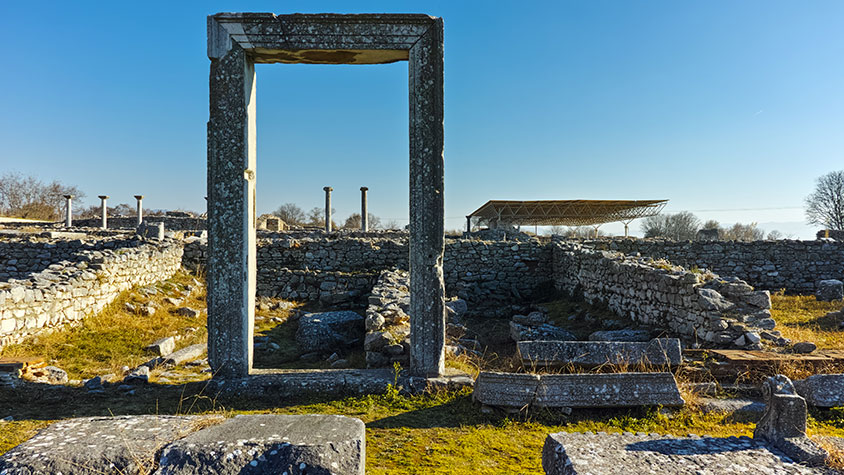It is often said that of all the ruins in ancient Greece, there are none as rich as those at Philippi. This UNESCO World Heritage site near the modern city of Kavala in the northeast of Greece, has perhaps the best footprint of early Christian history next to Jerusalem.
The city, originally named Krenides, was founded in the 4th century BC as a colony of the island of Thassos, which lies just south of Kavala. It was conquered in 356 BC and then occupied by Philip II of Macedon (father of Alexander the Great), who not only named the city after himself, but spearheaded its transformation into a central trading hub known as the Via Egnatia, which linked Europe and Asia. You can still walk the original route of the stone pavers that still mark the area.
Philip maximized the city’s vast valuable natural resources—particularly gold, silver, and timber—and established many of the archaeological landmarks visitors can see today, including many public and private structures as well as the theatre and an agora (Greek market).
Philippi would change hands in 42 BC, when the Battle of Philippi brought to an end the Roman Republic and placed the city at the forefront of a newly minted Roman Empire under Emperor Augustus.
The city’s status as an international center of trade and commerce contributed to its growth and transformation into a Roman colony. The expansion of the theatre to accommodate three stories worth of seating gave way to arena events, such as the Roman Games. Today, the theatre’s pristine structure is still used for performances during the summer festival in Philippi. You can also see the remains of the city’s Roman Forum (or marketplace) and other buildings central to daily life.
Perhaps most significant is how the Apostle Paul cemented Philippi’s status as the birthplace of the Church in Europe. Arriving in Philippi while on his second missionary journey—around AD 49 or 50—Paul preaches the Gospel to a crowd of women who had gathered by the river. Among those women was Lydia, who along with her whole household, received the Gospel and was baptized (Acts 16:13–15). Not long after, Paul and Silas were imprisoned for casting out a demon in a slave girl. The biblical account in Acts states that:
About midnight Paul and Silas were praying and singing hymns to God, and the other prisoners were listening to them. Suddenly there was such a violent earthquake that the foundations of the prison were shaken. At once all the prison doors flew open, and everyone’s chains came loose. – Acts 16:25–26
Today, you can see a brick-walled chamber believed to be the temporary cell of the Apostle Paul, simply called the “Prison of St. Paul,” which was converted later into a small church. There is also an octagonal-shaped open-air baptistry dedicated to St. Lydia of Thyatira. An annual adult baptism ceremony, which is open to the public, is held at the site on May 20.
Over the centuries, Philippi became home to several churches, some of whose remains can still be seen. You can see remnants of two basilicas built in the fashion of the Byzantine churches of Constantinople. They were destroyed by an earthquake not long after their construction in the 5th century AD, but parts of the original frescoes and doorways can be viewed.
At the center of Philippi’s Christian legacy is the Octagonal Church, built atop a ceremonial site dedicated to the Apostle Paul. It contains a church which appears square from the outside, but octagonal within.
Visitors should not miss the Archaeological Museum of Philippi, located on-site and split over two levels. The first level features artifacts from Philippi’s prehistoric to Roman eras, including coins, jewelry, sculptures, and vases. The second level features artifacts of the city’s Christian heritage, starting in the Early Christian Period to Philippi’s subsequent abandonment at the start of the Ottoman occupation.
Follow in the Apostle Paul’s footsteps! Plan your tour of Philippi today!
Email Cindy at cindy@israeladvantagetours.com or
visit www.israeladvantagetours.com to make your trip of a lifetime a reality!















